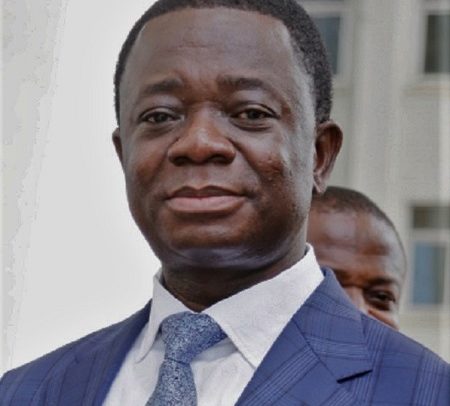Dr. Stephen Opuni
The sixth prosecution witness in the trial of former Chief Executive Officer of Ghana Cocoa Board (COCOBOD), Dr. Stephen Opuni and his accomplice, Seidu Agongo, has been discharged by an Accra High Court after ending his cross-examination by defence lawyers.
The witness, Peter Osei Amoako, Director of Finance at COCOBOD, was put under rigorous cross-examination by Nutifafa Nutsukpui, counsel for Mr. Agongo and his company, Agricult Ghana Limited, who questioned the witness about procurement processes at COCOBOD and the role of the Entity Tender Committee (ETC).
The lawyer asked the witness if he was aware that by a letter dated November 18, 2015, the ETC of Cocobod gave its management approval to procure fertilizers including the Lithovit liquid fertilizer through sole sourcing, and the witness said he did not know.
Mr. Nutsukpui then put it to the witness that the “ETC is actually the one that must approve the method or mode of procurement at COCOBOD and the witness responded that “My Lord, at any point in time COCOBOD determines the method based on the products and the usage.”
“And Sir, to your knowledge, does the ETC play any role in that determination by COCOBOD?” the lawyer asked again.
The witness responded that “My Lord, by the time it gets to ETC a procurement plan has already been approved. And My Lord, if I quite remember I don’t know whether sole sourcing should go to Entity but per what you are reading that is what was done.”
Lawyer: Sir, does the ETC play any role in the procurement plan process as far as you are aware?
Witness: My Lord, I said that the ETC looks at various evaluation reports that have been done by committees set up by COCOBOD and make their recommendations.
Lawyer: Sir, as the Director of Finance, who has responsibility for the procurement unit, do you know whether in the process of extracting the procurement plan from the approved consolidated budget the ETC plays any role?
Witness: My Lord, I said that when the procurement plan was extracted from the consolidated budget, the plan would go to the board, the board would refer it to the procurement subcommittee of the board, the procurement subcommittee would prepare a report to the board for consideration and approval.
The lawyer at a point put it to the witness that it was erroneous on his part to create an impression that a letter written to the Public Procurement Authority only covered Lithovit fertilizer when there were other fertilizers listed in the requested.
The witness, however, refuted the claim, stating that “I did not create any impression My Lord. When I tendered in this exhibit, I mentioned that the letter was from PPA, I mentioned the date and I also mentioned the header that it was headed so-so and so and then made reference to the fact that it was a response to a COCOBOD letter dated February 27, 2014. And then I mentioned the signatories of the letter and who the letter was sent to at Ghana COCOBOD.
The witness was discharged by the court presided over by Justice Clemence Honyenuga, a Supreme Court judge sitting as an additional High Court judge.
The trial continues on January 11, 2021.
Evidence
The witness, who led in his evidence-in-chief by the Director of Public Prosecutions (DPP), Yvonne Atakora-Obuobisa, had told the court among other things that Dr. Opuni allegedly signed a contract for the supply of fertilizer for the 2014/2015 crop season with an expired certificate from the supplier.
He also told the court about how Dr. Opuni wrote a letter to the PPA to single source the purchase of 700,000 litres of lithovit liquid fertilizer at an estimated price of $19.25 million.
The company that was given the contract was Agricult Ghana Limited, owned by a businessman, Mr. Agongo, who had been charged with causing financial loss to the state.
He also told the court how the Board of COCOBOD decided to terminate the 2016/17 contract awarded to Agricult Ghana Limited owned by Mr. Agongo.
He also told the court that per the records, the fertilizer which was the subject matter of the trial, did not go through the two-year minimum testing period as required, and said that although the fertilizer was only tested on seedlings, the product procured was applied on mature cocoa trees.
BY Gibril Abdul Razak


